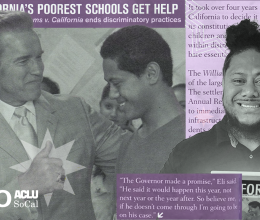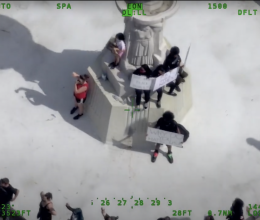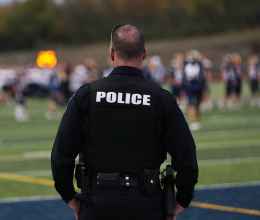
Hello! Students Have a Right to Privacy in Their Cell Phones
Indiscriminate cell phone searches threaten students' privacy rights in ways that have never before been possible. Sweeping searches threaten to expose a tremendous amount of private, personal information, and to teach our youth that such invasions of privacy are routine parts of civic life.
The right to privacy is one of our most basic and cherished constitutional rights. It protects us from unwarranted government intrusions into our personal affairs. As one of our most well known and highly respected U.S. Supreme Court justices put it nearly eighty years ago, the drafters of the Constitution “sought to protect Americans in their beliefs, their thoughts, their emotions and their sensations. They conferred, as against the government, the right to be let alone – the most comprehensive of rights and the right most valued by civilized men. To protect that right, every unjustifiable intrusion by the government upon the privacy of the individual, whatever the means employed, must be deemed a violation of the [Constitution]. ”
The American Civil Liberties Union (ACLU) has a long and proud history of defending the right to privacy. As technology has advanced, the law has often struggled to keep pace and ensure protection for personal information. As technology now provides new ways to gather information and databases containing personal information proliferate, the need for privacy protections becomes more urgent. The ACLU is a national leader in working to guarantee that individuals may determine how and when the government can gain access to their personal information.
The ACLU has protected employees in their personal electronic mail; patients in their medical records and, indeed, their very DNA; airline passengers in the face of intrusive and ineffective full body scans; internet users in their profiles, search histories and purchases; and cell phone users in their phone records and data. The ACLU also has long advocated to protect the privacy rights of public school students. Although it has long been established that students do not shed their constitutional rights at the schoolhouse gate, 2 students’ privacy rights have been under constant threat of erosion. The ACLU has been at the forefront of their defense, opposing such invasions of student privacy as electronic monitoring and tagging of jerseys and backpacks, the collection of student information in electronic databases to be shared with the federal government and military recruiters, random drug testing, and unreasonable surveillance.
This report addresses the intersection of technology and student rights – the searches and seizures of students’ cell phones.
Related content


Beyond the classroom: how students sued California for almost $1...
November 2, 2023Sanchez v Los Angeles Department of Transportation
March 15, 2022
Recordings Show the California Highway Patrol’s Aerial Surveillance...
November 16, 2021
No Police in Schools
August 24, 2021
Even in COVID, student mental health is still not a priority
January 6, 2021
Yes on 15 is yes on racial justice
October 30, 2020
Banning My “Phenomenally Black” Shirt Is Only a Symptom of the...
August 4, 2020